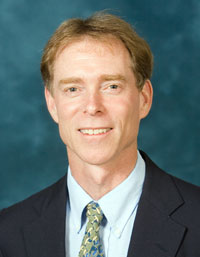 Professor Noel Perkins has been appointed to the Donald T. Greenwood Collegiate Professorship of Mechanical Engineering, by the Regents of the University of Michigan.
Professor Noel Perkins has been appointed to the Donald T. Greenwood Collegiate Professorship of Mechanical Engineering, by the Regents of the University of Michigan.
“It means a great deal to me that this professorship bears Don’s name and with it, an association with his tremendous reputation and scholarship,” says Perkins. “Don’s treatise Principle of Dynamics remains the standard reference for students and scholars worldwide in our field. It is literally the book in which most students—including this one—’cut their dynamics teeth’.”
It is an honor well deserved for the Arthur F. Thurnau professor of mechanical engineering whose research training lies in dynamics and, particularly, in nonlinear and computational dynamics and vibrations. His current research program involves both theoretical and experimental studies on the mechano-chemistry of single molecule DNA and protein-DNA interactions, the development of wireless MEMS inertial measurement systems for human motion analysis, and engineering structural dynamics.
Using modeling concepts from engineering to explore how the long DNA molecule bends and twists within the cell and under the influence of proteins that control cellular functions, Perkins and his collaborators are addressing fundamental questions concerning gene regulation and repair as well as DNA transcription and replication. “The models enable us to test hypotheses about DNA structure to a level of detail that far exceeds the resolution limits of experimental methods,” explains Perkins.
His work in the development of miniature, wireless MEMS-based inertial measurements units for use in tracking human motion has moved beyond the research lab and into commercial use. Motivated by his love of fly-fishing, Perkins set out to define the precise motion imparted to the fly rod by the caster’s hand using a small angular rate gyro. Collaborating with Bruce Richards, an engineer who designs fly line for Scientific Anglers/3M, they quantified the fly casting “signatures” of thousands of fly fishers in order to understand what defined superb casting skill, how to measure it, and how to instruct individuals in acquiring those skills. The result is a portable fly casting analyzer that has earned Perkins international media coverage ranging from Trout Fisherman to Business Week, as well as the Academic Challenge Award from the Technical University of Munich and ISPO in 2005.
The success of the fly casting analyzer has led to the formation of Perkins and Richards’ company Cast Analysis, LLC, as well as extensive research into other sports such as golf, baseball, hockey and bowling with Dr. Kevin King a former graduate student in his lab . His collaborations with UM Medical School, ME Professor Arthur Kuo and Kinesiology Professor Scott McLean have led to broader application of his research including, respectively, surgeon training, gait monitoring, and knee-injury monitoring.
Perkins has held editorships and editorial board positions with several journals including the International Journal of Non-linear Mechanics, the Journal of Sound and Vibration, and the Journal of Applied Mechanics. He was been awarded the GM Outstanding Distance Learning Faculty Award in 2007 and 2001, the Amoco Undergraduate Teaching Award in 2002, and was elected a Fellow of the American Society of Mechanical Engineers in 2000.
Perkins earned his Bachelor’s, Master’s and Doctorate degrees in Mechanical Engineering at the University of California at Berkeley. He spent a year as a post-doctoral student at the Institute for Sound and Vibration Research in Southampton, England before joining UM as an Assistant Professor in 1987.
Despite a lengthy list of honors, Perkins cites the heartfelt comments of students as those he finds most meaningful. He looks forward to the opportunities the professorship affords him and his students to explore new ideas and jump-start new projects. “I derive considerable satisfaction from teaching and training students in the field of dynamics,” says Perkins. “It is a thrill to share with them the discovery of something new, and often, quite unexpected.”
